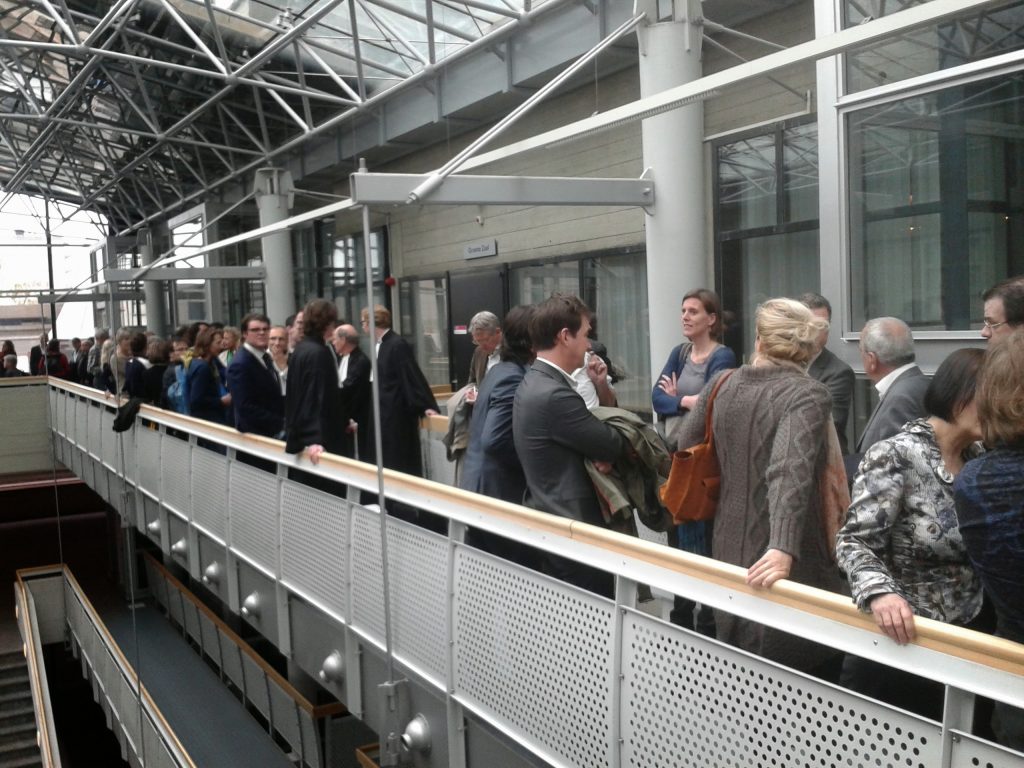De nobele kunst van het kabeltrekken is een van de meest winstgevende activiteiten in Nederland medialand. Dat bleek op dinsdag 15 april in de Amsterdamse rechtbank. Daar stonden de Nederlandse schrijvers, vertegenwoordigd door Lira, tegenover de grote kabelmaatschappijen en producenten, vertegenwoordigd door een paar hele dure advocaten, afkomstig uit de kantoortorens op de nabijgelegen Amsterdamse Zuidas.
De kabelmaatschappijen vinden zichzelf de grootgrutters van de Nederlandse mediamarkt. Hun advocaat verklaarde dat tijdens deze zaak, die gaat om een bedrag van ongeveer 13 cent per kabelaansluiting in Nederland. In die beeldspraak zien de kabelaars, die in totaal een winst maken van anderhalf miljard euro per jaar, de omroepen en televisieproducenten als levensmiddelenfabrieken. Daar doen ze graag zaken mee, tegen een deel van de monsterwinst, voordat die over de grens verdwijnt, in de zakken van het Amerikaanse megabedrijf Liberty Global, dat eigenaar is van bijna alle kabels in Nederland.
Helemaal onder aan de pikorde staan volgens de kabelmaatschappijen de schrijvers. Zij zijn dus de lopendebandwerkers van de voedingsindustrie, de naaisters in het overvolle Bengaalse atelier, de koelies op de koffieplantage. Het geeft geen pas, zo beweerde de kabeladvocaat voor de rechter, dat die onderdeuren bij de eindverkoper langskomen om een deel van de winst op te eisen. Hoe klein dat deel ook is.

Deze beeldspraak wekte de woede op van de bijna 100 schrijvers die in de zaal zaten. Schrijvers van series als Penoza en Flikken Maastricht, maar vooral ook de mensen die schrijven voor jeugdprogramma’s als Het Klokhuis en Sesamstraat. Deze schrijvers, die wel wat meer doen dan alleen pinda’s malen, krijgen namelijk al jaren weinig betaald door de omroepen en producenten. Ze leveren soms een sketch, die in het geval van Het Klokhuis bijvoorbeeld honderden keren hergebruikt wordt. Daarvoor kregen ze tot 2012 vergoed via de zogenaamde ‘kabelgelden’: een miniem deel van de extra winst die de kabelmaatschappijen maakten door producten steeds opnieuw aan te bieden. 27 jaar lang betaalden die, tot ze er op een dag mee ophielden, precies ook de dag dat ze een deal sloten met de omroepen en producenten, waarbij de schrijvers in de kou werden gezet. Vooral jeugdschrijvers lopen nu soms een kwart van hun toch al niet zo hoge inkomen mis.
[Tweet “Feitelijk verdient nu alleen de tussenhandel aan het televisieaanbod.”]De zaak loopt al een paar jaar, en steeds lijken rechters te vinden dat schrijvers en producenten er onderling maar uit moeten komen. Maar steeds opnieuw blijkt ook dat die producenten, samen met de kabelmaatschappijen, helemaal geen zin hebben om ook maar iets van die extra opbrengst te delen met de mensen die niet alleen de spreekwoordelijke pinda’s persen, maar ze ook zaaien, opvoeden, en zelfs bedenken en veredelen. Feitelijk verdient nu alleen de tussenhandel aan het televisieaanbod. De kijker betaalt, de maker ontvangt een schijntje.
Ook de schrijvers van series als Max Havelaar en ‘Hoe duur was de suiker?’ staan dus met lege handen.
Fair Trade? De rechter doet op 28 mei uitspraak.

RT @Reclassed: http://t.co/F2iSOV20UW
RT @Reclassed: http://t.co/F2iSOV20UW
Kan ik zo kwaad van worden http://t.co/a3zowwxkH3 @cultuurpers
Feitelijk verdient nu alleen de tussenhandel aan het televisieaanbod. http://t.co/gNSMeNQ4Cl via @cultuurpers
UPC voor de rechter: ‘Schrijver is lopendebandwerker’ http://t.co/yJE62tb6cu
@nterhall @cultuurpers @UPC nou heb ik ooit bij PCD (pindafabriek) aan de lopende band gewerkt, was weinig creatiefs aan, rare vergelijking
UPC voor de rechter: ‘Schrijver is lopendebandwerker in pindakaasfabriek’. http://t.co/ROdftp6UBN via @cultuurpers
http://t.co/F2iSOV20UW
UPC voor de rechter: ‘Schrijver is lopendebandwerker in pindakaasfabriek’. http://t.co/WEnkftCoD1 via @cultuurpers @UPC @AstridOosenbrug
UPC voor de rechter: ‘Schrijver is lopendebandwerker in pindakaasfabriek’. http://t.co/WEnkftCoD1 via @cultuurpers @UPC
Blijkbaar ben ik een lopende-band werker… #rechtzaak #lira http://t.co/3nXr19cN19
Feitelijk verdient nu alleen de tussenhandel aan het televisieaanbod. http://t.co/nnEU1Lg4XA via @cultuurpers
UPC voor de rechter: ‘Schrijver is lopendebandwerker in pindakaasfabriek’. http://t.co/HMl7vox3Ex via @cultuurpers
Feitelijk verdient nu alleen de tussenhandel aan het televisieaanbod. http://t.co/dfetl3HL8I via @cultuurpers
UPC voor de rechter: ‘Schrijver is lopendebandwerker in pindakaasfabriek’. http://t.co/hurOZPGdwp via @cultuurpers
RT @cultuurpers: UPC voor de rechter: ‘Schrijver is lopendebandwerker in pindakaasfabriek’. http://t.co/BmbHaozdsE
RT @cultuurpers: UPC voor de rechter: ‘Schrijver is lopendebandwerker in pindakaasfabriek’. http://t.co/BmbHaozdsE
RT @cultuurpers: UPC voor de rechter: ‘Schrijver is lopendebandwerker in pindakaasfabriek’. http://t.co/BmbHaozdsE
Claudia Pietryga liked this on Facebook.
RT @tseadbruinja: UPC voor de rechter: ‘Schrijver is lopendebandwerker in pindakaasfabriek’. http://t.co/4MDtYjYu73 via @cultuurpers
RT @tseadbruinja: UPC voor de rechter: ‘Schrijver is lopendebandwerker in pindakaasfabriek’. http://t.co/4MDtYjYu73 via @cultuurpers
UPC voor de rechter: ‘Schrijver is lopendebandwerker in pindakaasfabriek’. http://t.co/4MDtYjYu73 via @cultuurpers
Feitelijk verdient nu alleen de tussenhandel aan het televisieaanbod. http://t.co/DtJgWaOGCL via @cultuurpers
UPC: ‘Schrijver is lopendebandwerker in pindakaasfabriek’, aldus @wijbrand http://t.co/7JmyxnbWoP
Suzanne Brink liked this on Facebook.
Reacties zijn gesloten.